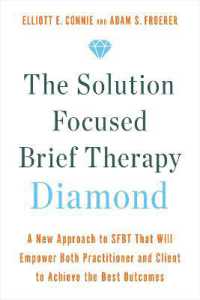- ホーム
- > 洋書
- > 英文書
- > Literary Criticism
Full Description
The drop in Spanish birth rates in 1998 to their lowest level of 1.1 births per woman was accompanied by a boom in publishing about motherhood. New narrative forms, ranging from blogs to diaries to comics, expressed women's experiences, including ambivalence about motherhood in the face of societal pressures. Narrating Infertility in Spain, the first study of infertility in post-2008 female-authored texts, analyzes discussions of adoption, assisted reproduction, egg and sperm donation, and the decision not to have children due to economic or social instability. By examining the work of writers and vocal activists Silvia Nanclares, Raquel SÁnchez-Silva, Samantha Villar, Laura Freixas, and Diana LÓpez Varela, Bourland Ross situates infertility in Spain within the cultural context of the Great Recession, while considering it as a business, a crisis, a stigma, and a class issue, and offering broader understandings of contemporary fertility challenges in Spain and beyond.
Published by Bucknell University Press. Distributed worldwide by Rutgers University Press.
Contents
Preface
Introduction
Chapter 1: Infertility as business: Quien quiere ser madre by Silvia Nanclares
Chapter 2: Infertility as stigma: Tengo los Óvulos contados by Raquel SÁnchez-Silva
Chapter 3: Infertility as crisis: Madre hay mÁs que una by Samanta Villar
Chapter 4: Infertility as classist: A mÍ no me iba a pasar by Laura Freixas
Chapter 5: Infertility as choice: Maternofobia by Diana LÓpez Varela
Conclusion
Notes
Bibliography
Index








